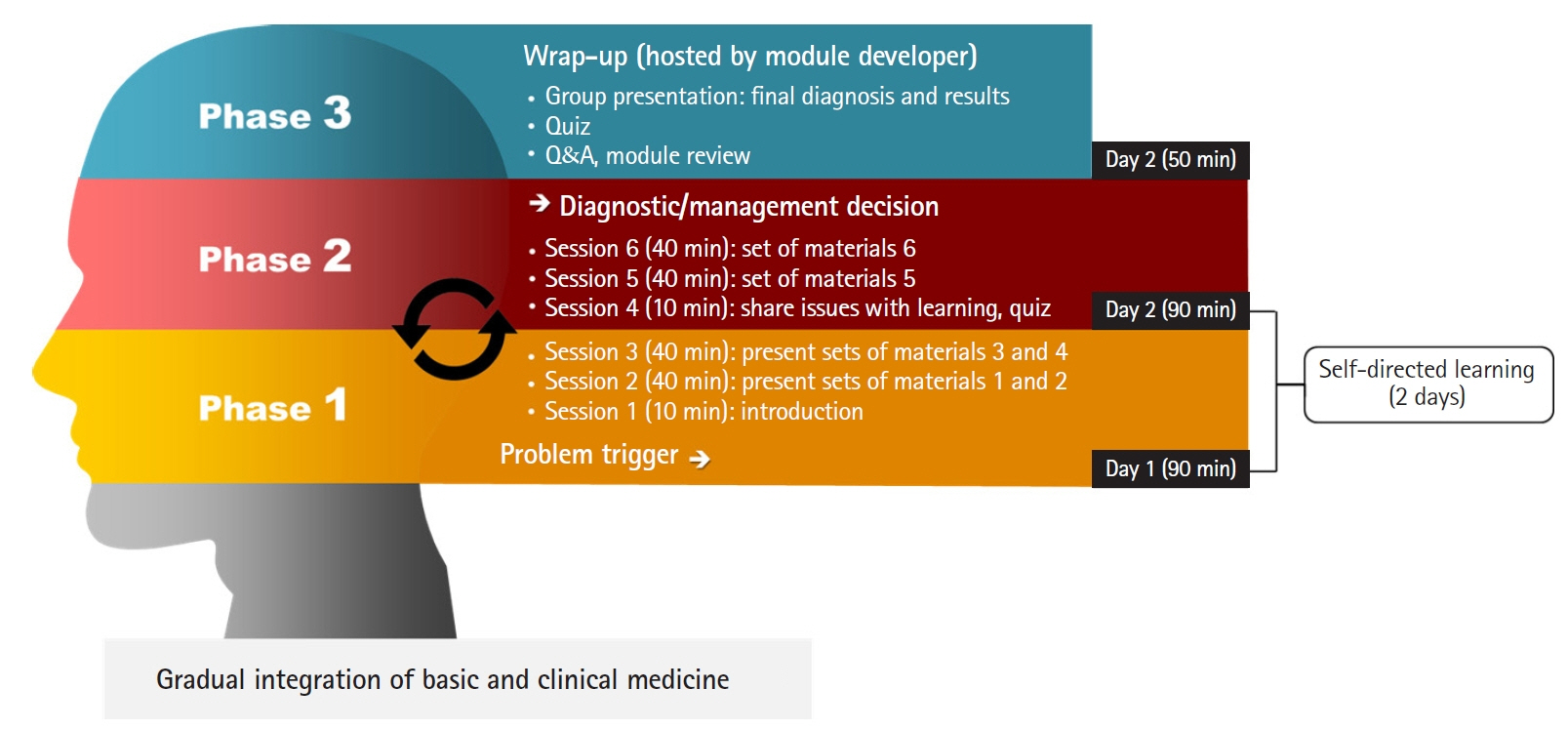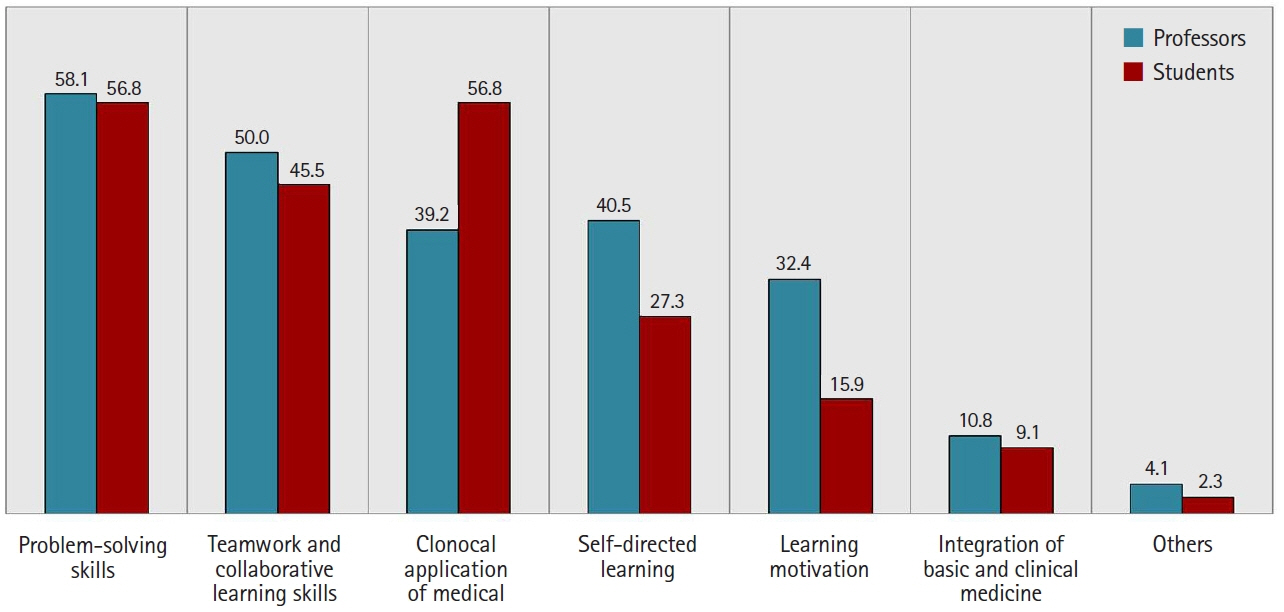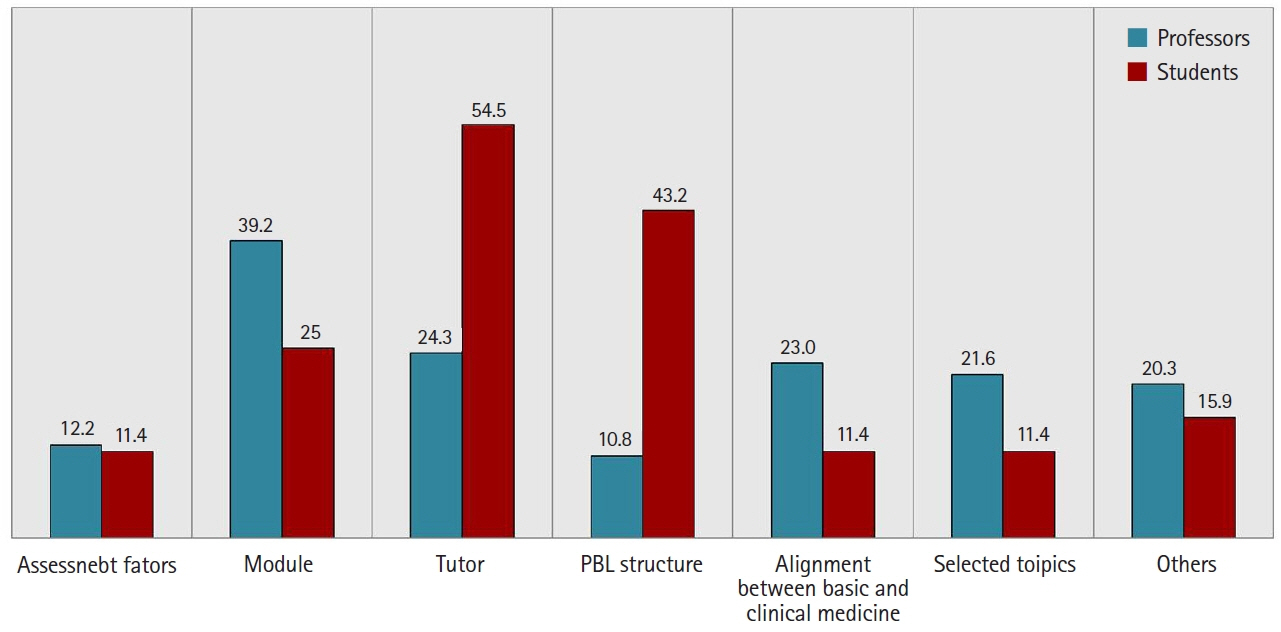J Educ Eval Health Prof.
2019;16:20. 10.3352/jeehp.2019.16.20.
Satisfaction with and suitability of the problem-based learning program at the Catholic University of Korea College of Medicine
- Affiliations
-
- 1Department of Medical Education, College of Medicine, The Catholic University of Korea, Seoul, Korea
- KMID: 2502179
- DOI: http://doi.org/10.3352/jeehp.2019.16.20
Abstract
- Purpose
This study was conducted to identify suggestions for improving the effectiveness and promoting the success of the current problem-based learning (PBL) program at the Catholic University of Korea College of Medicine through a professor and student awareness survey.
Methods
A survey was carried out by sending out mobile Naver Form survey pages via text messages 3 times in December 2018, to 44 medical students and 74 professors. In addition, relevant official documents from the school administration were reviewed. The collected data were analyzed to identify the achievement of educational goals, overall satisfaction with, and operational suitability of the PBL program.
Results
The overall satisfaction scores for the PBL program were neutral (students, 3.27±0.95 vs. professors, 3.58±1.07; P=0.118). Regarding the achievement of educational goals, the integration of basic and clinical medicine and encouragement of learning motivation were ranked lowest. Many respondents expressed negative opinions about the modules (students, 25.0%; professors, 39.2%) and tutors (students, 54.5%; professors, 24.3%). The students and professors agreed that the offering timing of the program in medical school and the length of each phase were suitable, while opinions expressed in greater detail pointed to issues such as the classes being held too close to exams and their alignment with regular course units.
Conclusion
Issues with modules and tutors were the most pressing. Detailed and appropriate modules should be developed on the basis of advice from professors with experience in PBL tutoring. Inconsistencies in tutoring should be reduced by standardization and retraining.
Keyword
Figure
Cited by 1 articles
-
Newly appointed medical faculty members’ self-evaluation of their educational roles at the Catholic University of Korea College of Medicine in 2020 and 2021: a cross-sectional survey-based study
Sun Kim, A Ra Cho, Chul Woon Chung, Sun Huh
J Educ Eval Health Prof. 2021;18:28. doi: 10.3352/jeehp.2021.18.28.
Reference
-
References
1. Baeten M, Kyndt E, Struyven K, Dochy F. Using student-centred learning environments to stimulate deep approaches to learning: factors encouraging or discouraging their effectiveness. Educ Res Rev. 2010; 5:243–260. https://doi.org/10.1016/j.edurev.2010.06.001.
Article2. Bate E, Hommes J, Duvivier R, Taylor DC. Problem-based learning (PBL): getting the most out of your students-their roles and responsibilities: AMEE guide no. 84. Med Teach. 2014; 36:1–12. https://doi.org/10.3109/0142159X.2014.848269.
Article3. Dolmans DH, Loyens SM, Marcq H, Gijbels D. Deep and surface learning in problem-based learning: a review of the literature. Adv Health Sci Educ Theory Pract. 2016; 21:1087–1112. https://doi.org/10.1007/s10459-015-9645-6.
Article4. Brauer DG, Ferguson KJ. The integrated curriculum in medical education: AMEE guide no. 96. Med Teach. 2015; 37:312–322. https://doi.org/10.3109/0142159X.2014.970998.
Article5. Schmidt HG, Rotgans JI, Yew EH. The process of problem-based learning: what works and why. Med Educ. 2011; 45:792–806. https://doi.org/10.1111/j.1365-2923.2011.04035.x.
Article6. Al-Madi EM, Celur SL, Nasim M. Effectiveness of PBL methodology in a hybrid dentistry program to enhance students’ knowledge and confidence: a pilot study. BMC Med Educ. 2018; 18:270. https://doi.org/10.1186/s12909-018-1392-y.
Article7. O Doherty D, Mc Keague H, Harney S, Browne G, McGrath D. What can we learn from problem-based learning tutors at a graduate entry medical school?: a mixed method approach. BMC Med Educ. 2018; 18:96. https://doi.org/10.1186/s12909-018-1214-2.
Article8. Chng E, Yew EH, Schmidt HG. To what extent do tutor-related behaviours influence student learning in PBL? Adv Health Sci Educ Theory Pract. 2015; 20:5–21. https://doi.org/10.1007/s10459-014-9503-y.
Article
- Full Text Links
- Actions
-
Cited
- CITED
-
- Close
- Share
- Similar articles
-
- The Effect of Urogenital System Subject Suitability on Learning Usability and Learning Satisfaction in Medical Humanities Online Discussion Class
- Effect on Problem-Based Learning with Simulation in Nursing Student According to Team Activity Satisfaction: Self-Directed Learning Ability, Communication Apprehension
- Effects of Simulation with Problem-based Learning on Care for Patients with Autonomic Dysreflexia
- Students' Satisfaction and Perception of Problem Based Learning Evaluated by Questionnaire
- Review on the administration and effectiveness of team-based learning in medical education




